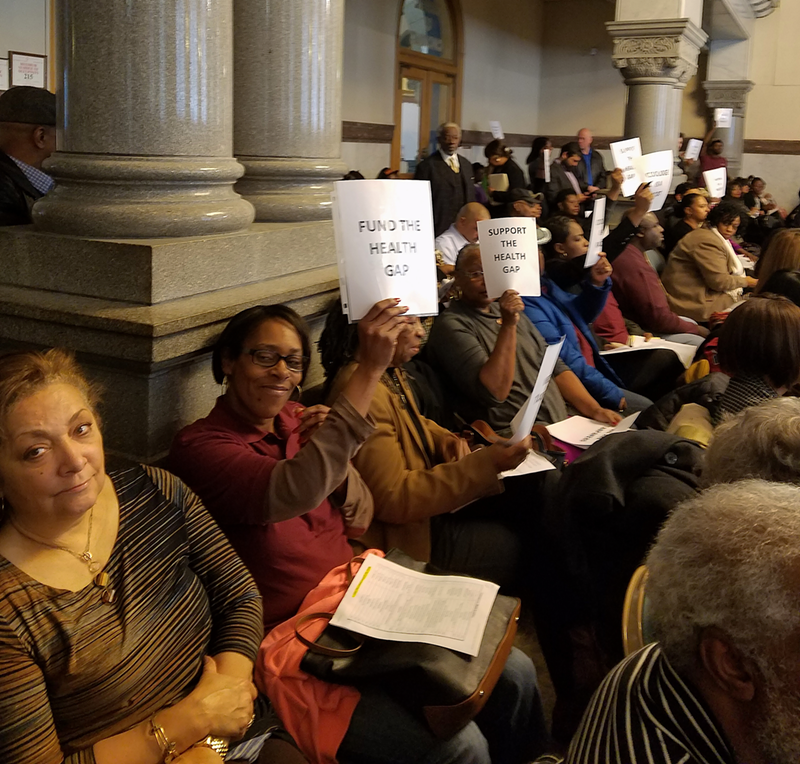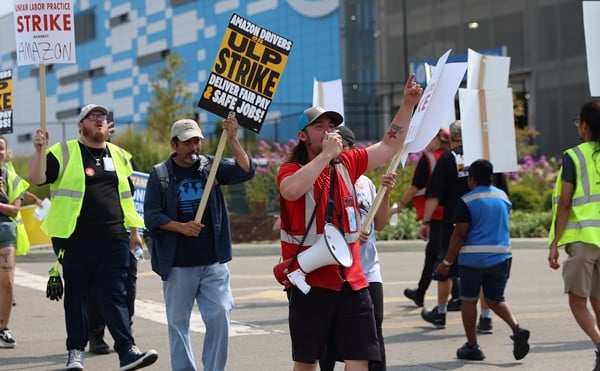
About 150 activists, volunteers, employees and supporters of the Center for Closing the Health Gap rallied at City Hall yesterday during City Council’s regular meeting to protest what they say is unfair treatment of the nonprofit by the media and Mayor John Cranley.
The protesters, organized by Cincinnati’s chapter of the National Action Network President Bishop Bobby Hilton, said recent media reports about the Health Gap and a subsequent call by Cranley for an investigation into the group are racially and politically motivated. The nonprofit is run by former Democratic mayor and one-time Cranley ally Dwight Tillery.
"Our work is recognized around the country,” Tillery said. “Black folks are at the bottom in this city and that's affecting our health."
The Health Gap has received increasing amounts of money in the city’s budget every year since Cranley came into office and was initially seeking a boost from $1 million to $5 million in the next budget, even as the city faces a $25 million deficit and 10 percent cuts to the city’s Health Department. The group later rescinded that request and is currently seeking its current $1 million allocation in the next budget.
The Cincinnati Enquirer and WCPO published dueling reports on the same day about the nonprofit, suggesting that fewer than half of 11 stores involved in a Health Gap healthy produce initiative were still part of the program a year later, that it had spent a large portion of its city funds on salaries and consulting fees, and invoiced about $3,600 in expenses incurred by Black Agenda Cincinnati, a political organizing group that Tillery is also active in. The city refused those invoices, saying they weren’t part of the Health Gap’s contract, but approved all other spending by the organization.
Allies of the Health Gap claimed the group has reached thousands of people through its community engagement work, healthy eating and fitness education initiatives and other efforts.
Tillery and the nearly 50 people who signed up for the public comment portion of the meeting didn’t dispute the findings of media reports but say they’re incomplete and misleading. Many speakers like Caroyln Evans, a former city employee who does work with the Health Gap’s “Do Right” campaign, highlighted the work the Health Gap does in low-income communities like Mount Auburn and Avondale. A number of speakers gave stern rebukes to Cranley and charged the mayor with playing politics after a falling out between him and Tillery, his 2013 campaign co-chair. Tillery indicated earlier this year that he wouldn’t endorse Cranley’s re-election bid, saying the mayor had “let the black community down.”
Among the Tillery supporters: Health Gap Board Chair Mark Vander Laan, a prominent local attorney who defended the nonprofit’s financial practices; former State Sen. Eric Kearney; long-time community activist Iris Roley; former Cincinnati Health Commissioner Stanley Broadnax; and representatives from Hispanic advocacy organizations LULAC and Catholic Charities of Greater Cincinnati's Su Casa.
Council members Yvette Simpson, Wendell Young, Charlie Winburn and Chris Seelbach questioned the timing of the investigations. Seelbach acknowledged the need for strict accountability for organizations spending taxpayer money but said he was concerned about the way the investigation into the Health Gap was unfolding. Seelbach questioned why, if the nonprofit’s spending was inappropriate, the city approved its invoices for years.
“I do find it incredibly troubling that a month and a half before an election, the spotlight is being shone" (on the Health Gap)," Seelbach said.
Cranley, governed by rules keeping officials from responding during the public comment session, said little about the investigation or the Health Gap. His only comments came during Council’s regular session, where he pushed back at questions about the audit.
“I don't know what the worry is about holding tax dollars accountable,” Cranley said. “If you want to introduce legislation stopping the audit, do it."
As the meeting reached into its fourth hour, things began to get testy between council members and Cranley. Councilman Christopher Smitherman called the Health Gap issue "a smokescreen" before railing against Democrats, the streetcar and "a small portion" of the community that doesn't respect the police.
Winburn, a longtime Cranley ally, mounted an especially intense defense of the Health Gap, and Cranley and Councilman Young tangled at the end of the meeting after Cranley attempted to adjourn. Young accused Cranley of trying to leave while he was still speaking.
"I'm glad to sit here and continue to listen to you insult me," Cranley said.





